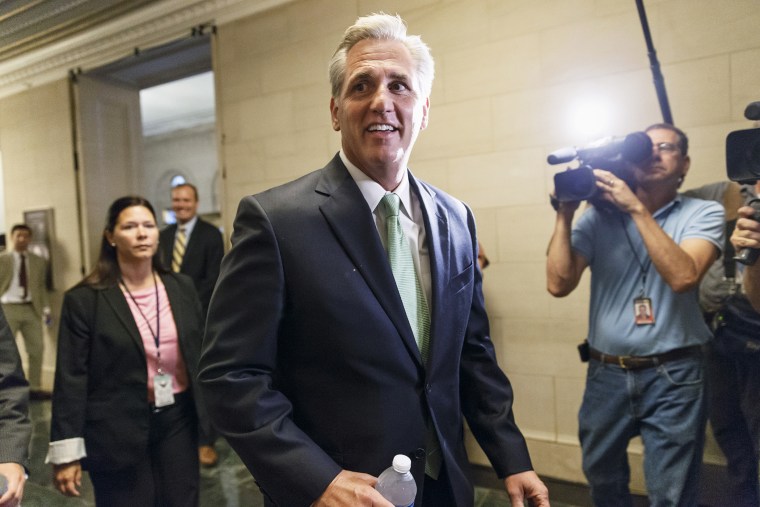House Republicans have chosen California Rep. Kevin McCarthy as their new majority leader, replacing the departing Virginia Rep. Eric Cantor after his surprising primary loss to David Brat.
McCarthy will become the second-ranked Republican in the House after previously holding the third-ranked position of majority whip. He defeated challenger Idaho Rep. Raul Labrador, a popular conservative member who participated in a failed attempt to oust Ohio Rep. John Boehner as speaker last year. The vote count was not released, either to the public or to the members themselves, but McCarthy was considered a strong favorite going in.
Rep. Steve Scalise of Louisiana won a follow-up vote to replace McCarthy, adding a leader with closer ties to the more conservative wing of the caucus.
RELATED: 5 things to know about Kevin McCarthy
While Cantor’s loss to an underfunded tea party challenger was a shock to the system, McCarthy’s ascension means the majority leader position will remain in the hands of an establishment player instead of one of the more rabble-rousing conservative members. He and Cantor were close legislative allies over the last several years as part of a group of GOP leaders dubbed the “young guns” that also included Wisconsin Rep. Paul Ryan.
Cantor’s defeat held particular relevance to the immigration debate. Polls showed voters in his Virginia district were largely supportive of immigration reform, but Brat ran hard against Cantor’s alleged flirtations with “amnesty,” raising the question of whether the issue was growing more dangerous for Republican leaders.
Despite these concerns, both McCarthy and Labrador are considered relative moderates on the issue, having each publicly supported a path to legal status for undocumented immigrants that few of their colleagues have proven ready to embrace. The House GOP is still highly unlikely to bring up significant legislation addressing the issue this year.
The whip race was more competitive and also broke down partly along establishment and conservative lines. This time, however, a conservative candidate defeated a close McCarthy ally.
Scalise, chairman of the influential Republican Study Committee, positioned himself as a potential bridge between the tea party and establishment wings of the party. The RSC, which includes nearly three-quarters of the GOP caucus, is a policy operation known for producing an alternative budget that's even more austere than the Ryan-authored proposals the House has adopted in recent years. Decking out his supporters with “Geuax Scalise” signs, he also offered the prospect of a Southern perspective in leadership for a caucus that’s increasingly comprised of Southern members.
Scalise's top opponent, Illinois Rep. Pete Roskam, served as McCarthy’s deputy and came from the more establishment side of the party. He pledged to tap a Southern member as his deputy whip if he won, in an effort to address the regional imbalance. The dark horse was Indiana Rep. Marlin Stutzman, who sought to position himself as the voice of the newer and more conservative generation of Republican members elected in 2010 and 2012.
